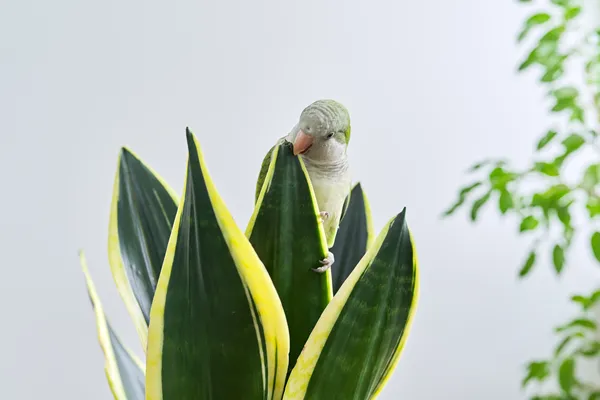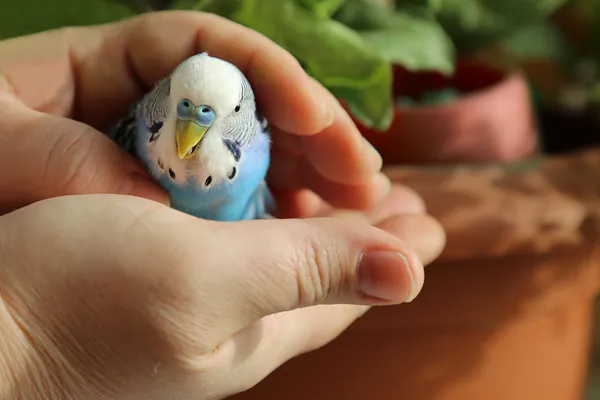Should pet birds be allowed to eat plants?
Many bird species eat fruit, nuts, seeds, and, rarely, the leaves of plants as a part of their natural diet. Birds often use their beaks to explore their environment, as well as to eat. Like toddlers, birds tend to put everything in their mouths.
Plant poisoning can occur in a variety of ways. Well-meaning owners may offer plant-based foods to provide a more natural and varied diet. Plants may also be added around a bird’s housing to provide enrichment. If birds are allowed to roam the house or go outside, they may be unintentionally exposed to poisonous plants.
Studies regarding the safety of specific plants related to birds are limited. In many cases, information must be inferred based on known risks to other species. The safety of certain plants is also related to the species of bird; plants that are poisonous to a macaw may not cause the same signs in a pigeon. Too many plants exist to completely understand every poisonous plant. A general knowledge of non-toxic plants can help you provide dietary variety and environmental enrichment for your pet birds.
“It is best to prevent access to plants unless their safety for birds is known.”
Luckily, most plants considered poisonous do not cause serious illness. Stomach upset is the most common sign of poisoning, although some plants can cause severe effects or even death. Due to the possible harmful effects, it is best to prevent access to plants unless their safety for birds is known.
What are some common plants that are poisonous to birds?
Many bird owners share food with their birds or add plants to vary the bird’s diet. However, you should never feed avocado, onions, garlic, or rhubarb leaves. Avocado may cause difficulty breathing, heart problems, and agitation in birds. Onions and garlic can cause red blood cell destruction and kidney damage. Rhubarb leaves have been associated with digestive upset, low blood calcium levels, and kidney damage. Ingestion of even small amounts of these plants can cause death.
Abnormal heart rhythms and changes in heart rate have been noted after birds have ingested Lily of the Valley, Oleander, Rhododendron, Japanese Yew, or Foxglove.
Dieffenbachia and Philodendron are common household plants. Birds can develop digestive upset, mouth pain and, rarely, difficulty breathing when these plants are ingested.
A list containing all the plants that are poisonous to birds cannot be provided. The following list includes many plants which may be poisonous to birds. Plants that are specifically reported to be harmful in birds are indicated with an asterix (*).
| Aloe vera | English ivy | Nightshade |
| Amanita mushrooms | Flamingo plant | Oleander* |
| Amarylis | Florida beauty | Onion |
| Andromeda japonica | Fruit salad plant | Orange day lily |
| Asian lily | Foxglove* | Panda |
| Asparagus fern | Garlic* | Peace lily |
| Australian nut | Glacier ivy | Plumosa fern |
| Autumn crocus | Gladiolas | Poinsettia* |
| Azalea | Glory lily | Pothos |
| Avocado* | Gold dieffenbachia | Precatory bean |
| Birds of Paradise | Gold dust dracaena | Queensland nut |
| Bittersweet, American | Green gold nephthytis | Red emerald |
| Bittersweet, European | Heavenly bamboo | Red-margined dracaena |
| Black locust* | Holly | Rhododendron* |
| Branching ivy | Hurricane plant | Rhubarb |
| Buckeye | Hyacinth | Ribbon plant |
| Buddhist pine | Hydrangea | Rubrum lily |
| Caladium hortulanum | Iris | Saddle leaf philodendron |
| Ceriman | Japanese show lily | Sago palm |
| Charming diffenbachia | Jerusalem cherry | Schefflera |
| Chinaberry tree | Kalanchoe species calla lily | Spotted dumb cane |
| Chinese evergreen | Kalmia species castor bean | Stargazer lily |
| Christmas rose | Lace fern | Straight-margined dracaena |
| Clematis* | Lacy tree | Striped dracaena |
| Cordatum | Lilies | Sweetheart ivy |
| Corn or cornstalk plant | Lily of the valley* | Swiss cheese plant |
| Cutleaf philodendron | Macadamia nut | Taro vine |
| Cycad, Sago, Zamia palms | Madagascar dragon tree | Tiger lily |
| Cyclamen | Marbie queen | Tomato plant, green parts only |
| Daffodil | Mexican breadfruit | Tropic snow dumbcane |
| Day lily | Marijuana | Tulip |
| Deadly nightshade | Mistletoe | Variable dieffenbachia |
| Devil’s ivy | Morning glory | Virginia creeper* |
| Dumb cane | Mother-in-law plant | Warneckii dracaena |
| Easter lily | Narcissus | Yew: Japanese, American |
| Elephant ears | Needlepoint ivy | Yew: English, Western* |
| Emerald feather or fern | Nephthytis | Yucca |

Poison Helpline, an animal poison control center based out of Minneapolis, MN, is available 24/7 for pet owners and veterinary professionals that require assistance treating a potentially poisoned pet. The staff provides treatment advice for poisoning cases of all species, including dogs, cats, birds, small mammals, large animals, and exotic species. As the most cost-effective option for animal poison control care, Pet Poison Helpline’s per-incident fee includes follow-up consultations for the duration of the poison case. Pet Poison Helpline is available in North America by calling 800-213-6




